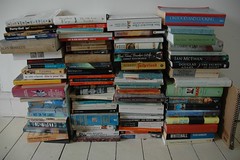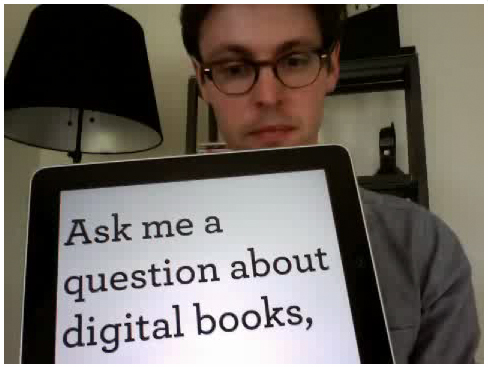In the still buzzing world of “Seth Godin versus print publishing” much has been said in favor and against Godin’s announcement that he will no longer publish books traditionally. I’ve been fascinated with the debate. I’m an unabashed neophyte in the world of agents, editors, publishers and book retail, and I profess to know little as a still-hopeful in the world of publishing. But I’m a fan of Godin’s ideas, energy and quasi oracular vision, and I’ve been fascinated with digital storytelling in its diverse and perennially morphing potential for a decade.
Back in the shadow of Y2K I lead a workshop in Paris for teachers called Storytelling in the Digital Age that explored the merits of (and methods for) embracing new narrative media in the classroom. That workshop evolved into a semester-long elective for high school students at the American School of Paris, exploring the roots and evolution of storytelling while developing a methodology for digital narrative craft. Remember, those were heady days when Dana Atchley was at the peak of his all too short life.
It’s stunning how much has changed since then. Staggering. And not a little scary (ie: “One Dark Side of Publishing Changes“) either… But it’s also thrilling and exhilarating! And inevitable. Though not everyone agrees on this last point. In evidence, consider this poignant request from the sage, book loving Gail Hyatt:
It’s true that things are changing drastically in the world of words and ideas. Nobody knows this better than you. You’re a big reason. The possibilities are being realized faster than we can absorb them. However, in my opinion, the end of traditional publishing has not yet come. Not at all. It has a most crucial and vital part to play in feeding our souls and our minds and challenging us to change our lives. I see this fleshed out in my own home. Mike’s chair is the perfect example. Propped in the seat is his laptop, waiting to be awakened for the day. The iPad is perched on the side table next to THE DIP and the highlighter, and the is Kindle peaking up from his briefcase on the floor waiting to be compared to the newest Kindle which will arrive sometime today. I want to encourage to rethink this “quitting.” You say one has to know when to quit and when to stick. Don’t quit that which is obviously sticking. You and your works have a place in our lives that will never be unstuck and we’re very grateful for that. I think your best work is yet to come … and that’s saying A LOT! Maybe not right now. Maybe it needs to ferment for several years. Who knows? All I hope is that, when it does come, you don’t quit and you give it to us in every form possible—especially traditional publishing. Please reconsider. (The Treasure Hunt, by Gail Hyatt)
And while Gail Hyatt is begging Seth Godin not to quit, many others are excoriating and chastising him for his decision. Fortunately, there are also some level heads approaching Godin’s announcement with a more metered, more academic interest. For instance, Mitch Joel shares the feedback from his literary agent, James Levine, regarding four critical considerations for other writers considering emulating Seth Godin:
- Fan base. Must be fanatic, very large, and inclined to read the author’s works in digital format. This won’t work right out the gate for authors whose main following is in print.
- Marketing savvy and support. Aside from being very smart about marketing, the author needs to have the staff in place to execute, execute, execute, daily, daily, daily. Many authors will underestimate how expensive and time consuming this is.
- Long term money goals. The author needs to be able/willing to forego the short-term guarantee from a publisher [known as “the advance”] and bet on long term sales direct from consumers (the per unit revenue to the author is much bigger when the author acts as the publisher).
- Platforms. It’s important to realize that this approach will make the most sense for authors who make most of their money by speaking/consulting to business audiences. In this sense, books are a form of advertising for the more lucrative services provided by these authors. (“You Are Not Seth Godin“)
Joel adds two further essentials: a top flight editor and a team of performance driven sales reps. Starting to sound like going the Seth Godin way involves launching your own publishing company? To some degree, yes! Joel goes on to remind us that Godin’s ability to make this brave decision nevertheless relies on more than these parts. Godin tirelessly invested “decades of doing tons of things… that all had him in direct connection with the people who will buy his books from him, talk about it to their peers and evangelize his always-brilliant thinking.” In short,Godin has a world class platform. Do you?
What Seth, The Wall Street Journal, the book publishing industry and the literary agents aren’t telling you is that you can – in fact – be just like Seth Godin. These Digital Marketing channels are here for you (and they’re free – if you don’t count the time you need to put into them). In text, images, audio and video you too can publish how you think to the world… instantly. You too can share with others, build relationships and get your ideas to spread. You do not have to rely solely on mass media to help spread the word. And, you’ll know in short order, if your idea has traction… and you’ll be able to track how that idea spreads and connects.
In the end, you are not Seth Godin, but you can be. (“You Are Not Seth Godin“)
In Seth Godin’s words, “The business race is on to have the relationship with the reader.” According to Mark Coker (CEO of Smashwords) “the distribution advantage of having new titles in bricks-and-mortar bookstores will have to be weighed against the potential financial advantage of retaining ownership of a new book and distributing it as an e-book or on a print-on-demand basis.” Makes sense, right?
But others argue that this misses the point. Joel J. Miller argues that Godin has misunderstood “what traditional publishing is about. We sell books to people who love them, to people who crave them, who love bookstores, who love reading…” True. And you sell books to lots of other people who don’t love them but need them, rely upon them, etc. And you may be missing an opportunity to sell books to lots of people who simply haven’t considered buying them because they don’t love them, don’t need them, don’t rely upon them, etc. Right? Wrong, says Miller.
Godin’s basic misapprehension is that people don’t like books. There are billions of dollars exchanged every year that say differently. If you’re a reader, your own habits probably say differently. Mine do.
The second misapprehension is that books are a clunky way to deliver and spread ideas… For people who love them, there are few things more elegant or efficient than books…
A third misapprehension is not Godin’s fault. It’s our own. Godin’s personal business model is perhaps set up for him to succeed with this independent adventure. Good for him. Most authors, however, are not set up to go it alone. Likewise, most publishers are not set up to translate many of Godin’s ideas into their models. As authors and publishers, we should spend more time trying to please our customers than trying to justify ourselves to, or square our practices with, Seth Godin. (“What Godin gets wrong“)
I think this last issue is probably true. At least until the new digital publishing industry matures and begins to offer plug and play solutions to many of the challenges an indie author would encounter. And true too that most traditional publishers aren’t equipped to learn/adopt much from Godin.
But the first two “misapprehensions” strike me as somewhat naive. Sure, some people like and will continue to buy books, and many of those book buyers do indeed consider print books to be elegant and efficient. I am one of those book buyers. I love books. I will always love books. But that’s not the point.
I also love wine, and I am particularly fond of the ritual of opening a good bottle of wine. Cutting the foil is like breaking the wax seal on a letter or document, bold and permanent and assertive yet beautiful and not a little poignant. Once the foil or leading is trimmed away tidily, there’s no greater satisfaction that removing the cork from an aged but well maintained bottled of wine, each twist of the corkscrew adding to the anticipation…
It’s easy to romance wine corks. It’s easy to romance books. And with luck and sufficient numbers of passionate book and wine consumers, we’ll be able to enjoy both for a long time into the future. But screw caps, with all of their oenological, environmental and economic logic are making rapid inroads, and the likelihood of screwcaps gradually eclipsing corks is increasing with every vendange. The point isn’t that some of us prefer corks, but that the industry is changing because there’s greater oenological, environmental and economic value in screwing than corking! Does that mean that corking is dead? Probably not. But it’s likely to become exceptional, less widely available, and more expensive. Miller seems to miss this inevitability.
Literature is like running. It’s not for everyone, but for people who love it stopping after four blocks fails to satisfy. There are miles to go. It’s immersive. It’s also time consuming, but real readers are like real runners; you settle into a good pace and time evaporates. People whose primary reading is Facebook and street signs might not get that. Fine. Selling books to them is a waste of time and effort. Thank God that’s not the task before publishers. (“What Godin gets wrong“)
Whether or not literature and running are similar is a dabble for another day, but it’s clear to me that Miller’s off target. The shifting of the publishing industry from print to digital isn’t about those who love books, love running or love corks in their wine bottles. And if his oversimplified notion that the digital alternative to elegantly bound tomes is blog posts and Facebook, then it’s no wonder he’s confused and concerned. We’re at the dawn of digital publishing. The user-friendly innovations that will propel digital content into the next century aren’t even dreamed up yet. Nook, Kindle, Vook, etc. are mere prototypes for the next generation of content conveyances. But they are already considerably more evolved and useful as digital publishing platforms than blogs and Facebook!
Clinging to an industry which has largely grown obsolete is lamentable, but failing to recognize the inevitability of the shift and failing to recognize the enormous potential represented by the shift is indeed naive. Let’s be frank and honest; the publishing industry not only resisted change, it kept its head in the sand for far too long. This change isn’t happening overnight. It isn’t an unanticipated fluke. It’s been a gradual evolution, the slowly building wave that only recently has started to crest!
The music industry offered possibly the best case study and the most abundant lessons. If the Big Six had studied the music industry over the last decade and adapted the most successful lessons, they’d be surfing the wave now instead of paddling like mad! But the music industry is only one example. Reflect back on the transition from traditional film photography to digital photography. Remember the detractors, the naysayers, the purists, the film lovers, the darkroom junkies, the overconfident executives who scoffed at the need to reinvent cameras, developing and photography. And note too that evolution from film to digital photography is responsible for the virtual ubiquity of cameras today. Every gadget imaginable includes a camera, and the proliferation of photo sharing, archiving and publishing gadgets demonstrate that this evolution had the effect of democratizing photography. It also opened up massive markets that had been overlooked or unfathomable prior to inexpensive digital cameras.
I suspect this example is particularly relevant to the transition in the publishing industry today. Some people love books and bookstores. Agreed. But look at how many do not. Look at how many never even consider books. And recognize that like digital photography which has proliferated beyond anyone’s wildest expectations, the transition to digital publishing will similarly transform the production and spread of information. And though we’re not all Seth Godins, not by a long shot, this brave new world of digital publishing will make it possible for you, me, anyone with ambition, intelligence and hard work to develop a platform and build an audience who appreciate, justify and contribute to our literary creations.
Like this:
Like Loading...













